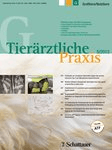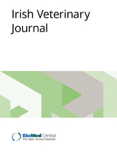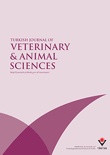
Large Animal Review
Scope & Guideline
Advancing veterinary science for large animals.
Introduction
Aims and Scopes
- Veterinary Medicine and Surgery:
The journal publishes research on veterinary practices, surgical techniques, and case studies that contribute to the field of veterinary medicine for large animals. - Animal Health and Disease Management:
A significant focus is placed on studying diseases affecting large animals, including diagnostic methods, treatment protocols, and disease prevention strategies. - Nutritional Science and Feeding Practices:
Research on the nutritional requirements of large animals, including the effects of different diets on health, growth performance, and product quality, is a prominent theme in the journal. - Reproductive Biology and Breeding:
The journal covers studies related to reproductive health, artificial insemination technologies, and genetic factors influencing breeding and production outcomes. - Behavior and Welfare Assessment:
Research pertaining to animal behavior, welfare assessments, and the impact of environmental factors on the well-being of large animals is frequently explored. - Innovative Technologies in Animal Management:
The journal highlights advancements in technology and methodologies for monitoring, managing, and improving the health and productivity of large animals.
Trending and Emerging
- Impact of Climate Change on Animal Health:
Increasing focus on how climate change affects livestock health, productivity, and welfare, highlighting the need for adaptive management strategies. - Antimicrobial Resistance and Alternatives:
Research on antimicrobial resistance is trending, with a shift towards finding alternatives to antibiotics, such as probiotics and phytogenic feed additives. - Precision Livestock Farming Technologies:
The adoption of smart technologies and data analytics for monitoring animal health and performance is becoming a significant area of interest. - Genomic and Genetic Research:
Research in genomics and its application in improving livestock breeding, disease resistance, and productivity is on the rise. - Mental Health and Welfare in Livestock:
An emerging theme is the study of mental health and welfare in livestock, focusing on stress management and the psychological well-being of animals. - Sustainable Animal Production Practices:
Growing interest in sustainable practices within animal husbandry, addressing environmental impacts and resource efficiency.
Declining or Waning
- Traditional Breeding Techniques:
Research focused on conventional breeding methods is decreasing as interest shifts towards genetic engineering and biotechnology innovations. - Antimicrobial Use in Livestock:
While still relevant, studies specifically addressing antimicrobial use are declining as the industry moves towards alternative strategies for disease management and biosecurity. - Generalized Nutritional Studies:
The journal has seen a decline in generalized studies on nutrition without specific applications or innovative approaches, as there is a greater emphasis on precision feeding and targeted nutrition. - Non-specific Behavioral Studies:
Research that does not address specific welfare or management implications is waning, as the focus shifts towards studies that provide actionable insights into improving animal welfare. - Historical Perspectives in Veterinary Medicine:
There is a noticeable decrease in papers that focus on historical reviews or perspectives within veterinary medicine, as contemporary issues take precedence.
Similar Journals

TIERAERZTLICHE PRAXIS AUSGABE GROSSTIERE NUTZTIERE
Exploring the intersection of research and practical veterinary applications.TIERAERZTLICHE PRAXIS AUSGABE GROSSTIERE NUTZTIERE is a pivotal journal in the field of veterinary science, focusing specifically on large animals and food production animals. Published by GEORG THIEME VERLAG KG, this journal has been a resource for veterinary professionals since its inception in 1996, delivering current research and practical insights to its readership through 2024. Despite its classification in the Q4 quartile for both Food Animals and Veterinary (miscellaneous) categories, the journal provides an essential platform for emerging studies, contributing to the interdisciplinary dialogue around veterinary practices. Researchers and practitioners benefit from the journal’s commitment to advancing knowledge, despite its modest rankings in Scopus where it stands at rank #150 in General Veterinary and #32 in Food Animals. While not currently offering Open Access options, the journals’ significant body of work remains an invaluable asset for those dedicated to enhancing animal health and welfare. TIERAERZTLICHE PRAXIS serves as a cornerstone for academic exploration and practical application in the veterinary field, fostering a deeper understanding of the complexities involved in animal care and management.

Tropical Animal Science Journal
Connecting Science and Practice in Animal WelfareTropical Animal Science Journal, ISSN 2615-787X, E-ISSN 2615-790X, is an esteemed open-access journal published by the Bogor Agricultural University, Faculty of Animal Science. Launched in 2018, this journal serves as a pivotal platform for disseminating high-quality research in the fields of Animal Science, Food Animals, and Veterinary Medicine. With its significant presence in Indonesia and a commitment to scientific innovation, it has achieved a Q3 ranking in Animal Science and Zoology and Food Animals, as well as a Q2 ranking in Veterinary (miscellaneous) as of 2023. The journal also enjoys favorable Scopus rankings, placing it in the 61st percentile for General Veterinary and demonstrating its relevance and impact in the academic community. As an advocate for open-access publishing since its inception, the journal enhances accessibility to critical research findings, making it an invaluable resource for researchers, professionals, and students alike who aim to advance their knowledge and contribute to the fields of tropical animal science.

Animals
Innovating research for a better understanding of animal life.Animals is an esteemed open-access journal published by MDPI, focusing on the dynamic fields of Animal Science and Zoology, as well as Veterinary Sciences. Established in 2011, it has quickly garnered a prominent reputation, achieving Q1 rankings in both Animal Science and Veterinary (Miscellaneous) categories in 2023. With an impressive Scopus ranking placing it in the top 15% of Veterinary journals and the top 13% in Animal Science, Animals serves as a vital platform for researchers and professionals to disseminate and share innovative studies that advance knowledge in animal biology, husbandry, welfare, and veterinary care. By promoting open access since its inception, the journal ensures unrestricted availability of cutting-edge research to a global audience, fostering collaboration and inspiring further studies in the field. Located in the heart of Switzerland, at St. Alban-Anlage 66, Basel, Animals is essential for anyone dedicated to understanding and enhancing the welfare and management of animals across various disciplines.

Frontiers in Animal Science
Shaping the future of animal research, one study at a time.Frontiers in Animal Science is a pioneering academic journal dedicated to advancing knowledge and innovation in the fields of animal science and zoology. Published by FRONTIERS MEDIA SA in Switzerland, this open-access journal aims to bridge the gap between research and practice by providing a platform for impactful studies and discoveries. With an impressive Q2 classification in animal science and zoology for 2023, it ranks #222 out of 490 journals within the Scopus database, placing it within the 54th percentile of academic journals in its category. Since its inception in 2020, Frontiers in Animal Science has fostered interdisciplinary collaboration and innovation, encouraging researchers, professionals, and students alike to share their work and insights. By facilitating unrestricted access to quality research, this journal plays a crucial role in shaping the future of animal science and enhancing our understanding of animal biology and welfare.

IRISH VETERINARY JOURNAL
Connecting research and practice in veterinary excellence.IRISH VETERINARY JOURNAL is a premier open-access publication in the field of veterinary science, established to disseminate high-quality research and innovations that advance the veterinary profession and animal health. Published by BMC since 2004, this journal not only ensures worldwide access to cutting-edge findings but also maintains an impressive ranking as Q1 in the Veterinary (miscellaneous) category according to the 2023 metrics, highlighting its significance and influence. With an impressive Scopus rank of #19/194 and a 90th percentile placement, it provides a robust platform for researchers, professionals, and students alike to engage with the latest studies, reviews, and case reports. The journal's coverage spans from its inception in 1973 to the present, catering to a diverse audience interested in various aspects of veterinary science, ensuring that it remains an essential resource for those passionate about the welfare of animals and the advancement of veterinary practices.

TURKISH JOURNAL OF VETERINARY & ANIMAL SCIENCES
Enhancing Animal Welfare Through Rigorous Research.TURKISH JOURNAL OF VETERINARY & ANIMAL SCIENCES is a distinguished peer-reviewed journal dedicated to advancing knowledge in the field of veterinary sciences and animal health. Published by the Tubitak Scientific & Technological Research Council Turkey, this journal provides a platform for high-quality research, fostering scientific inquiry that spans various aspects of veterinary medicine, animal biology, and animal husbandry. With an impact factor that reflects its growing influence within the Q3 category of Veterinary (miscellaneous) according to the 2023 rankings, it is strategically positioned in the academic landscape, ranked #112 out of 194 in the broader veterinary field. The journal is committed to open access publications, ensuring that research is accessible to a global audience, facilitating collaboration and knowledge sharing among researchers, professionals, and students. By covering a broad spectrum of topics from clinical research to veterinary policy, the TURKISH JOURNAL OF VETERINARY & ANIMAL SCIENCES plays a crucial role in enhancing the understanding and welfare of animal species, thereby contributing significantly to both scientific advancement and practical applications in veterinary practice.

Italian Journal of Animal Science
Connecting global researchers for impactful discoveries.Italian Journal of Animal Science (ISSN: 1594-4077; E-ISSN: 1828-051X), published by Taylor & Francis Ltd, serves as a pivotal platform for the dissemination of cutting-edge research in the fields of animal science and zoology. Since its transition to Open Access in 2002, it has broadened its reach, allowing researchers from around the globe to share their findings and engage in critical dialogue. With its esteemed Q1 ranking in the 2023 category of Animal Science and Zoology and a notable position in the Scopus rankings—ranked 65 out of 490—this journal is a leader in driving the advancement of knowledge in animal science. The Italian Journal of Animal Science aims to publish original research articles, reviews, and methodological papers that contribute to the understanding of animal biology, welfare, nutrition, and conservation, making it a vital resource for researchers, professionals, and students dedicated to advancing the field. Based in the United Kingdom, and with a commitment to excellence, the journal is poised to continue fostering scholarly communication through 2024 and beyond.

Translational Animal Science
Transforming Animal Science into Practical SolutionsTranslational Animal Science, published by Oxford University Press Inc, stands as a prominent journal in the fields of Animal Science and Zoology as well as Veterinary Sciences, achieving a commendable Q2 ranking in both categories for 2023. With an E-ISSN of 2573-2102 and transitioning to an Open Access model since 2017, this journal fosters accessibility and dissemination of vital research that bridges the gap between basic animal science and its practical applications. The journal's significant impact factor, where it ranks in the 71st and 65th percentiles respectively for Veterinary and Agricultural and Biological Sciences disciplines, highlights its importance as a resource for emerging trends and innovations in animal research. With submissions accepted until 2024, Translational Animal Science not only contributes to advancing knowledge but also aims to engage a broad audience of researchers, professionals, and students dedicated to improving animal health and welfare. Based in India, the journal serves as an essential platform for the exchange of scientific ideas that facilitate progress within these vital fields.

Revista Colombiana de Ciencias Pecuarias
Pioneering Innovations in Veterinary Science and Animal WelfareRevista Colombiana de Ciencias Pecuarias, an esteemed publication in the field of Animal Science and Veterinary Studies, is published by the Universidad de Antioquia, Faculty of Agricultural Sciences. Since its inception in 1996, this Open Access journal has become a vital resource for the dissemination of research and advancements within the agricultural and biological sciences, specifically targeting the veterinary and animal husbandry sectors. Situated in Colombia, its mission is to support and promote scientific knowledge through rigorous review processes and high-quality articles. The journal’s recent classification includes Q4 in Animal Science and Zoology and Q3 in Veterinary categories, illustrating its commitment to enhancing its scientific impact. As it converges from 2008 to 2024, this journal aims to engage researchers, professionals, and students alike, establishing a collaborative environment for innovative research and findings that shape the future of animal sciences globally.

ISRAEL JOURNAL OF VETERINARY MEDICINE
Exploring Innovations in Animal Health and ScienceThe Israel Journal of Veterinary Medicine, published by the Israel Veterinary Medical Association, serves as a vital resource for researchers, professionals, and students in the fields of veterinary medicine and animal science. With a commitment to advancing knowledge across diverse veterinary disciplines, this journal plays a crucial role in disseminating significant findings and innovations that influence both local and global veterinary practices. Although it currently holds a Q4 ranking in both the Animal Science and Zoology and Veterinary (miscellaneous) categories, the journal's open access policy, enabling free availability of articles, aspires to increase its accessibility and engagement among the academic community. The journal's convergence of research from 2007 to 2024 showcases its dedication to continuously contributing to the evolving landscape of veterinary science.